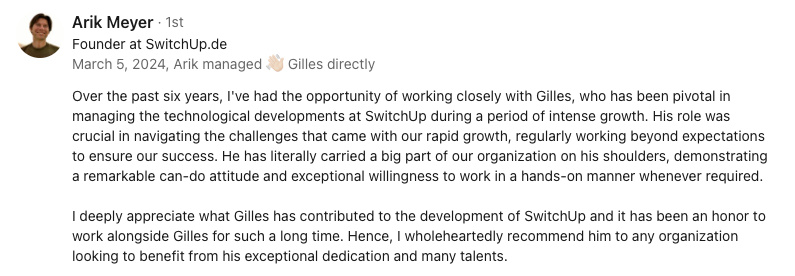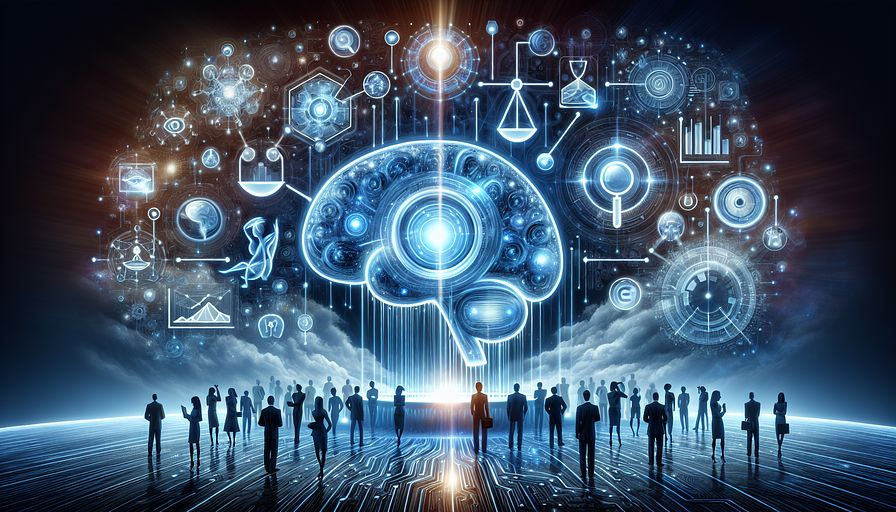Abstract:
The article explores how AI-powered collaboration tools are transforming European startups by enhancing communication and project management across multicultural teams. AI-driven tools like chatbots and real-time translators facilitate seamless interactions, breaking down language barriers and enabling efficient teamwork. Predictive analytics in project management optimizes resources and predicts risks, thus improving success rates. AI also supports decision-making by providing actionable insights and aligning team efforts with strategic objectives. Compliance with GDPR is streamlined through AI's automated checks, and data privacy is strengthened with threat detection and response systems. Moreover, AI promotes inclusivity by offering cultural training and personalizing collaboration strategies, catering to diverse team dynamics. Real-world examples, such as Typeform and Revolut, demonstrate AI's tangible benefits in boosting productivity and engagement. As AI technology evolves, future trends like advanced natural language processing promise further enhancements in collaboration. Embracing AI not only increases efficiency but also creates an inclusive work environment, positioning startups to excel in their industries.
You're at a café in Berlin, laptop open, trying to sync up with teammates spread across Europe. Each person speaks a different language, and the deadline is close. Many European startups face this situation. But AI tools are here to help. They're breaking down communication barriers with real-time translation and making project management easier with predictive analytics. Let's explore how AI is changing the way teams work together, helping startups become more efficient and successful.
AI-powered collaboration tools for European startups
In the busy world of European startups, communication and project management are key to success. Here's how AI is changing these areas to boost collaboration and efficiency.
AI-driven communication tools
Imagine a workspace where routine questions and scheduling are handled by AI, freeing people to focus on meaningful tasks. AI chatbots and virtual assistants do just that. They manage repetitive tasks, so team members can concentrate on more complex interactions. I've seen AI chatbots organize meetings, answer FAQs, and send reminders, saving loads of time.
Real-time language translation tools are also making a big impact. Microsoft Teams and Skype Translator help multicultural teams communicate smoothly. I once worked on a project with a team spread across Europe. With these tools, we avoided misunderstandings and turned conversations into productive collaborations.
AI also personalizes user experiences by analyzing behavior. For instance, Slack's AI suggests meeting times and highlights important discussions, making communication more engaging and efficient. As AI improves communication, it's also transforming project management.
AI in project management
AI is revolutionizing project management. Predictive analytics tools predict project risks and optimize resources, boosting success rates. Tools like Asana's Work Graph™ provide insights into task management, helping teams avoid potential issues. Using such tools, I've seen more accurate planning and proactive decisions, preventing many project risks.
AI excels at task prioritization and workflow automation, freeing teams to focus on strategic tasks. I've seen AI tools reduce the need for micromanagement, allowing us to concentrate on high-impact objectives.
AI's adaptability is another advantage. It can adjust project dynamics in real-time, offering critical tweaks to schedules and resources, enhancing flexibility. Imagine working on a project where sudden changes need quick action. AI's quick adjustments help keep the team agile and effective, preventing project derailments.
AI-driven decision-making tools for startups
Making quick, informed decisions is crucial for startups. AI is revolutionizing this process, providing new ways for executives to enhance their insights.
AI insights for executives
AI's role in uncovering actionable insights
Picture a conference room debate interrupted by an AI-generated report, filled with insights from various datasets. These tools analyze communication and project data, providing team productivity insights. Platforms like BetterWorks and Typeform track productivity metrics, helping leaders pinpoint improvements.
Transforming team dynamics through AI-driven suggestions
AI also improves collaboration by analyzing interaction patterns. It identifies bottlenecks and suggests strategies for better efficiency. Imagine an AI tool in Slack chats identifying the best times for meetings. These suggestions can significantly enhance team dynamics.
Aligning team efforts with strategic business objectives
AI doesn't just solve daily problems; it aligns team activities with business goals. AI insights help ensure that everyone's focused on achieving strategic objectives. Tools like Personio and DeepMind help managers fine-tune strategies, ensuring everyone understands their role in meeting business goals.
Real-time feedback and adaptation
Embracing immediate performance evaluations through AI
AI provides real-time feedback systems, allowing instant intervention if a project goes off course. Using Personio's real-time feedback feature, you can identify performance issues and intervene immediately.
Capturing team sentiment for proactive management strategies
AI also offers sentiment analysis tools for gauging team morale. Understanding team sentiment can help address issues early. Ada's sentiment analysis capabilities can flag morale declines, prompting timely actions.
Continuous improvement through automated feedback loops
AI automates feedback loops, ensuring teams align with business objectives and foster continuous improvement. Tools like Typeform automate analysis, keeping teams focused on improvement.
Staying compliant with GDPR when using AI
GDPR compliance can be tricky for startups, but AI makes it easier. By automating compliance checks, AI simplifies adherence to GDPR and ensures data integrity. For European startups, navigating these regulations is crucial, and AI can be a valuable ally.
- Automate compliance checks: Use AI to monitor and ensure data practices comply with GDPR.
- Maintain data integrity: Use AI to verify data accuracy and completeness.
- Regular updates: Keep AI updated to adapt to new regulations.
Data minimization is also crucial—AI systems designed with this principle help comply with GDPR's data processing regulations.
- Minimize data collection: Design AI systems to collect only necessary data.
- Purpose limitation: Ensure data is used only for its intended purpose.
- Reduce data retention: Use AI to automatically delete data when not needed.
Building trust through transparency
Transparency in AI algorithms is essential for GDPR compliance. Clear communication about AI processes builds user trust and ensures legal compliance.
- Explainable AI: Develop AI systems with explainable algorithms.
- User-focused transparency: Make information on AI operations accessible to users.
- Feedback mechanisms: Use AI to gather user feedback and improve processes.
Keeping data private with AI
AI is crucial in safeguarding data privacy by identifying threats and automating responses.
- Threat detection: Use AI to monitor for unusual activity and security breaches.
- Automated responses: Use AI to respond to threats, minimizing damage.
- Regular updates: Ensure AI systems are updated to tackle new threats.
AI systems can also audit data access and usage, maintaining privacy compliance.
- Access audits: Use AI to audit data access and usage.
- Usage monitoring: Track data usage patterns to identify unauthorized access.
- Continuous compliance: Use AI for continuous audits and compliance.
Ethical considerations in AI data management
Human oversight in AI processes prevents bias, ensuring ethical decisions.
- Bias audits: Conduct regular reviews to ensure fairness.
- Human interventions: Establish protocols for human intervention.
- Inclusive design: Incorporate diverse perspectives to mitigate biases.
Enhancing multicultural team dynamics with AI
Startups often work with multicultural teams. AI helps bridge communication gaps and enhance team dynamics.
Bridging communication gaps
Real-time translation is key for multicultural teams. AI tools like Microsoft Teams and Skype Translator enable instant language conversion. I've worked with teams from different backgrounds, and these tools were invaluable.
Beyond words, understanding cultural nuances is crucial. AI platforms provide cultural context and sensitivity, minimizing miscommunication and fostering deeper understanding. For example, AI can analyze communication styles and suggest culturally appropriate responses, helping team members navigate complex interactions smoothly.
AI also personalizes experiences. Tools like Slack and Asana adapt to cultural work styles, enhancing team harmony.
Personalizing collaboration
AI analyzes communication preferences and tailors collaboration strategies. This ensures everyone is comfortable and engaged.
AI-enhanced cultural training promotes inclusivity. Platforms offer cultural etiquette lessons and immersive experiences, building empathy and understanding.
The adaptability of AI tools meets diverse cultural needs. As startups grow, AI dynamically adjusts tools to align with evolving norms.
Real-world success stories: AI in action
AI integration in European startups has led to real improvements in collaboration and business processes.
Successful AI implementations
Typeform in Spain uses AI to automate surveys, boosting response rates. Personio in Germany uses AI for real-time feedback, reducing turnover. Revolut in the UK improves internal communications with AI, boosting customer satisfaction. These examples show how AI streamlines operations and improves engagement.
Lessons from AI-driven innovation
The experiences of these startups show the benefits of AI in business. AI-enhanced tools increase productivity and creativity, allowing teams to focus on strategic tasks.
- Increased productivity: AI manages routine tasks, freeing time for innovation.
- Agile team dynamics: AI fosters agility, enabling rapid responses to market changes.
AI integrations provide a competitive edge by streamlining decision-making and optimizing resources. Startups that embrace AI set the standard in their industries.
Future trends and considerations
As European startups embrace AI, understanding future trends is key to staying ahead. Emerging AI technologies promise to revolutionize collaboration.
Emerging AI technologies
Advancements in natural language processing
NLP is set to revolutionize communication tools. Imagine a virtual assistant that understands context and nuances.
Predictive project management tools
AI project management tools will become more predictive, helping teams anticipate challenges and allocate resources accurately.
Enhanced real-time collaboration platforms
Next-gen real-time collaboration platforms will use AI to deliver improved communication and engagement.
Considerations for AI adoption
Cost and integration challenges
Adopting AI involves strategic planning to navigate cost and integration hurdles. A cost-benefit analysis ensures expected benefits justify the resources spent.
Ethical design and inclusivity
Addressing ethical concerns, such as algorithmic bias, is crucial. Building AI solutions that respect diversity is essential.
The role of human oversight
Human oversight ensures AI decisions align with ethical standards. A human-in-the-loop approach provides a check on AI-driven processes.
In the fast-paced world of European startups, AI-powered collaboration tools transform challenges into opportunities. By streamlining communication and enhancing project management, AI breaks language barriers and boosts efficiency. Imagine your startup automating routine tasks, allowing your team to focus on strategic goals. These tools not only increase productivity but also foster an inclusive work environment where every voice is valued. Ready to leverage AI for your team? Share your thoughts or experiences in the comments. How has AI impacted your collaboration efforts?














